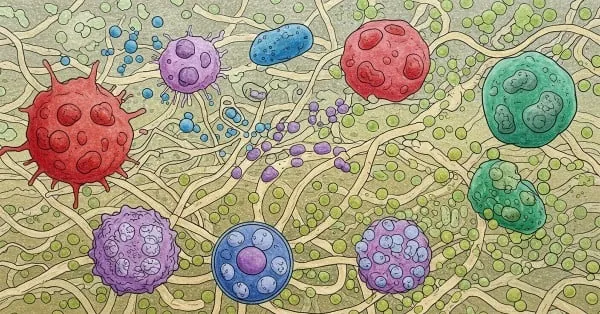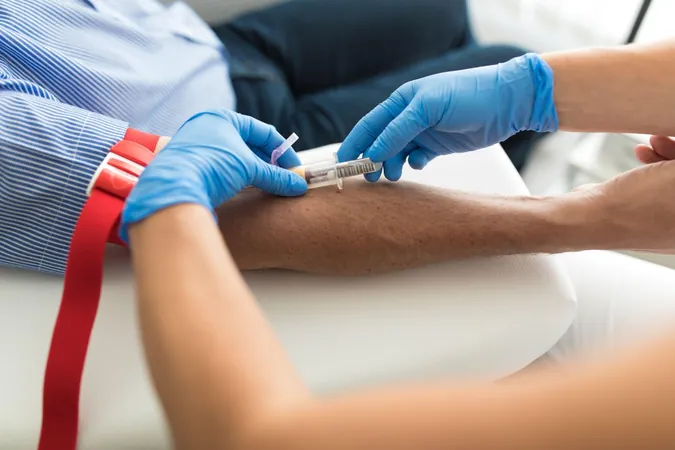
Unlocking the Secrets of Immune Aging: New Study Reveals Key Enzyme's Role
2025-04-17
Author: Jia
The Mysterious Decline of Our Immune System as We Age
As we grow older, our immune systems face a steep decline, leading to fewer cells capable of battling infections and aiding recovery from ailments. But why this happens has been somewhat of a mystery—until now.
A Breakthrough Discovery in Lipid Metabolism
Thanks to groundbreaking research published in *GeroScience*, scientists may have uncovered a significant factor behind this decline: an enzyme known as ELOVL2, or "elongation of very long chain fatty acids-like 2." Collaborating with researchers at UC Irvine, Leslie Crews, Ph.D., revealed that as this enzyme diminishes with age, it accelerates the immune system's aging process by disrupting lipid metabolism.
ELOVL2 is crucial for lipid synthesis, particularly for creating omega-3 fatty acids essential for cell membrane health. When its activity declines, the balance of lipids in immune cells shifts, hindering the development of B cells, vital white blood cells that produce antibodies.
Aging Immune Cells Under the Microscope
The research team conducted a detailed analysis in mice with an inactivated Elovl2 gene. Astonishingly, even at only 18-20 months old, these mice exhibited reductions in gene expression related to B cell development, mirroring conditions found in much older control mice. Their lipid profiles revealed a concerning resemblance to those typical of elderly mice, with inadequate levels of heart-healthy unsaturated fats.
The Impact on Human Immune Systems
To draw parallels with human health, researchers examined gene expression in hematopoietic stem cells from the bone marrow of individuals across various ages. They discovered a stark reduction in CD79B gene expression and ELOVL2-expressing cells in people over 60—insights that reflect findings from the mouse model. This trend suggests that age-related changes in lipid metabolism could ultimately compromise our body's ability to ward off infections.
Diet Matters: A Call for Omega-3s
Alarmingly, modern diets are often low in essential omega-3 fatty acids like DHA, further diminishing immune function. Previous studies underscore this link between diet and health, highlighting the urgent need for older adults to address dietary deficiencies.
Potential for Future Therapies
The researchers speculate that precision lipid supplementation tailored to individual needs could help combat immune decline in older adults. However, more research is needed to determine the most effective method of delivery. Gene therapy also presents an intriguing avenue worth exploring, as past studies have shown that enhancing ELOVL2 levels can improve health outcomes in aging mice.
Implications for Cancer Treatment
Beyond aging, the study hints at potential implications for blood cancers. The ELOVL2 enzyme and related genes, which are frequently altered in lymphoid malignancies like lymphoma, could pave the way for innovative cancer treatments.
The Future of Aging Research
As Skowronska-Krawczyk aptly stated, "By studying the biology of aging, we can uncover new therapies to prevent age-related diseases and enhance our healthspan." This research is a crucial step towards understanding how to preserve our immune defenses as we age, potentially leading to groundbreaking treatments for both aging and cancer.


 Brasil (PT)
Brasil (PT)
 Canada (EN)
Canada (EN)
 Chile (ES)
Chile (ES)
 Česko (CS)
Česko (CS)
 대한민국 (KO)
대한민국 (KO)
 España (ES)
España (ES)
 France (FR)
France (FR)
 Hong Kong (EN)
Hong Kong (EN)
 Italia (IT)
Italia (IT)
 日本 (JA)
日本 (JA)
 Magyarország (HU)
Magyarország (HU)
 Norge (NO)
Norge (NO)
 Polska (PL)
Polska (PL)
 Schweiz (DE)
Schweiz (DE)
 Singapore (EN)
Singapore (EN)
 Sverige (SV)
Sverige (SV)
 Suomi (FI)
Suomi (FI)
 Türkiye (TR)
Türkiye (TR)
 الإمارات العربية المتحدة (AR)
الإمارات العربية المتحدة (AR)